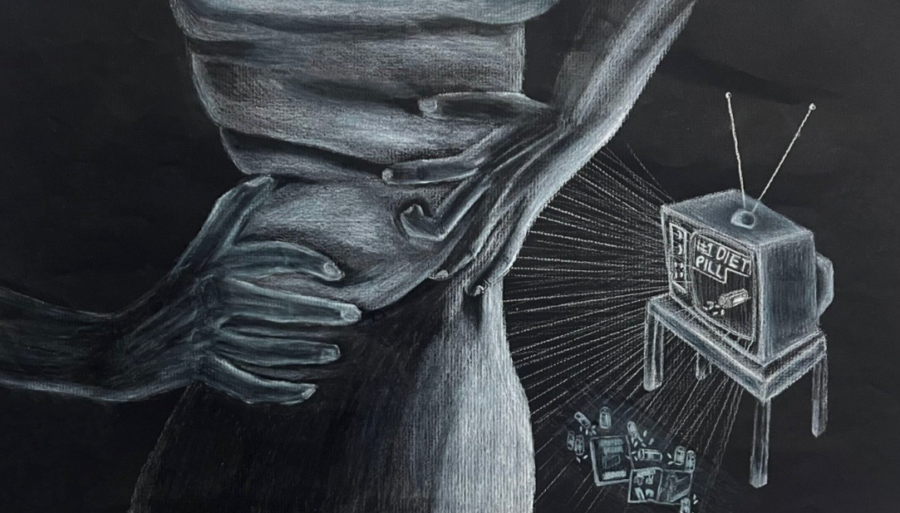Bathroom talk: body image
Junior Eva Neidlman focused her year-long art project on body image issues in young teenagers. Artwork by Eva Neidleman
May 30, 2023
I am soon to be entering my last year of high school, and I still feel like I haven’t let anybody see me.
I’m Shayda Dadvand, and I show up to school every day in a sweatshirt and sweatpants (or a sweatshirt and jeans, or in the fall occasionally a sweatshirt and a skirt. Point being, a sweatshirt).
I’ve always been tired of feeling uncomfortable in my skin and constantly hiding myself from others—both physically and emotionally.
I realized some months ago that I’ve been in hiding—making myself as invisible as possible. I hated people looking at me so much that I preferred they see right through me instead.
Even though I brought it upon myself, I’ve learned to hate that feeling of being invisible. The overwhelming feeling was enough to make me speak up more. It was enough to get me to befriend others and become more vocal in my classes. I often find myself speaking to people I don’t even know, and I surprise myself by how casually I talk to someone who doesn’t know me.
But that’s where I stopped stepping out of my comfort zone. I never changed out of a sweatshirt, and I still show up to school each day wishing I simply… could.
Why do we feel this way?
“Society puts a big emphasis on being pretty,” junior Harper Flynn said. “It’s so, so deep.”
Students pull out their phones to see influencers on social media replicating each other’s posts, creating an expectation for the average individual to look like who they see on their screen.
“It’s a really heavy message to send to young girls and teenagers that your individuality does not matter, and you have to be this one thing.”
We are taught that if we don’t look exactly like the straight-size models we see in the media, we simply aren’t enough.
What is just as strong as this message is the duration of time it’s been instilled in the brains of many. It’s 16-18 years of hearing, “‘This is what you should be.’”
For me, the message sunk in at nine years old. For over five years, I’ve internalized the idea that I am not enough because of the way my body looks. And for over five years, I have tried over and over to change my body in any way I can.
But of course this isolating mold is not realistic. My body is not the same body as that of a straight-size model. Does this mean my body is worse? Of course not. It’s just different. I could eat and exercise and sleep and live exactly the same way as someone else, and we would still likely have different bodies. And that’s okay, but as Flynn said, “it’s hard to come to that realization in your own subconscious.”
How do we get out of the hell we’ve kept ourselves in? There is no one method.
“At some point I thought, ‘I cannot keep living like this. I’m hungry,’” Flynn said. “If I eat this, I know it would make me happier. And that’s why I thought to myself: ‘You can’t do this to yourself.’”
Honestly, the average person will not look at you or your body and think negatively of it. In scaling ourselves as often as we feel imposed to, we hyperfocus on a number that nobody else knows. This does not stop us from overanalyzing ourselves.
Over the past week, I’ve started becoming able to take the sweatshirt off. While nobody else would notice it, the simple act means everything to me.





























